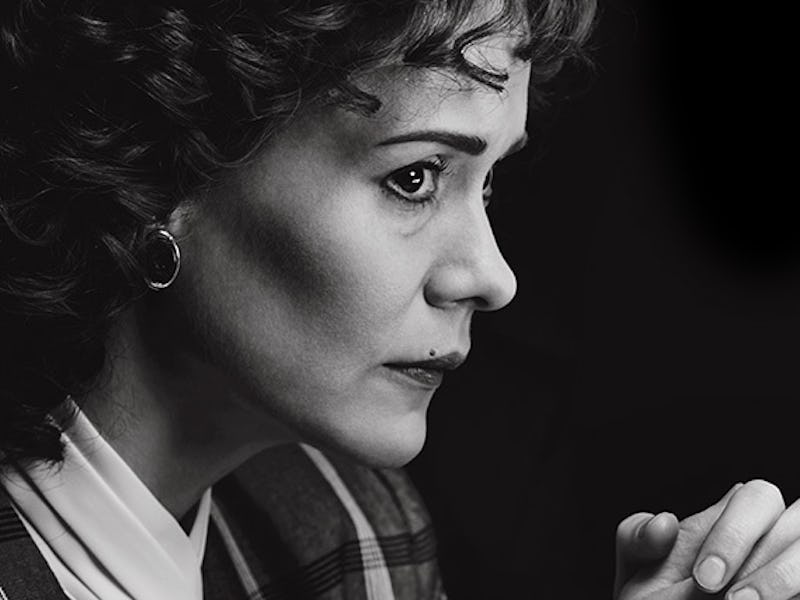Marcia Clark in 'The People v. O.J. Simpson' Speaks to the Donald Trump Era
Episode 6 illustrates the way in which this show is as much about today as 1994.

Last night, Republican presidential hopeful Donald Trump won primaries in Michigan and Mississippi, and the Hawaii caucus, effectively making him the only candidate in real contention for the nomination. As Trump’s star has risen beyond any detractor’s wildest dreams just a few months ago, media and cultural figures have made a particular point of slamming him: Outside of the inevitable daily op-eds, Louis C.K, Keith Olbermann, and John Oliver are recent, notorious examples. For as much negative coverage as Trump gets, and as many unconscionable, seemingly damning things he says, he is still sweeping most polls. One wonders, “Is there anything any human or force can do to shake him from his pedestal?” There are too many little spears, no one big one. He dismisses and ignores all criticism, with a more skillfully delivered insult, and business booms for him.
Yet during the O.J. Simpson trial, players’ pedestals were constantly being shaken. FX’s The People v. O.J. Simpson is ultimately not really about the details of the case — and perhaps not really about Simpson either. In fact, The show gives Cuba Gooding, Jr. little screen time, partially to avoid advocating for his guilt or innocence, but also, presumably, because that question is not that interesting — at least, compared the myriad of other issues and characters that in this story. It affected many lives and distorted judgments, forcing people to grapple with, and even embody, caricatures of themselves devised by the media.
The People v. O.J. Simpson doesn’t only string together tell-all factoids from Jeffrey Toobin’s tell-all book about the trial; it also often departs into a kind of sympathetic fan fiction, inspired by the intense media cocoon that mediated the the trial. In last night’s “Marcia Marcia Marcia,” Sarah Paulson’s version of Marcia Clark struggles to stomach tabloid castigations of her appearance — “frump incarnate” — and her parenting with poise or dignity. When she enters the courtroom emboldened about an adjusted, hipper hairstyle, she’s met by sardonic grins, an ironic thumbs-up from the defense, and a jibe from the judge. Later, she has a proper cry on the floor of her office after a topless tabloid photo is leaked by a previously-unheard-of ex-husband. “I’m not a public personality, this isn’t what I do…I just can’t take it,” she tells Chris Darden (Sterling K. Brown).
The real Marcia Clark told Vulture that the series does not, in many significant ways, reflect the reality, or her reaction to the extracurricular backlash. She didn’t change her hair for the media, and she didn’t cry in the courtroom — though Judge Ito’s treatment, in particular, did upset Clark. “They slammed my hair, my makeup, and I didn’t care,” Clark says. “Because what I cared about was that jury.”
The show may not not always tell it like it was — and make her seem more vulnerable — but Clark claims to love it, especially Paulson’s performance. Many of the pseudo-romantic details of her relationship with Chris Darden, she claims, are fabricated. Yet she celebrates them anyway: “They’re delivering the essence of our relationship, and that’s nice. It’s an essential truth even if it’s not a literal truth.” Clark’s curious comments remind us that American Crime Story is dramatizing rumors filled in, and finding the humanity behind much-parodied veneers. This is the show’s greatest strength: The embroidered drama reflects back, in meaningful ways, on the story as the world understood it at the time. It’s based on intel and theories that have come about since then.
The vision of Clark’s passion story here on Ryan Murphy’s show is, in fact, meant to show the monoculture that formed around the trial. A similar excitement is building: People are re-huddling around this show, hoping to gain new insight about the events. Ratings remain excellent. And yet, appropriately, on the show — and the deepening fact-checking or fact-shirking coverage of it — we see the opposite of that culture who oppresses Clark on the show. Like Donald Trump, the media of 2016 is an unparsable monolith of different views. It juts out in all directions. Outlets’ business model aim to break through the noise with opinions and speculations that contradict the prevailing ones — or just find unusual keywords that can contort and advance pre-existing Google search results. There is more information at our disposal as consumers. Though we may be watching the same show, we are cynical (or wily) enough now to analyze and interrogate every little element of it and sell it for parts.
Today’s media is still a powerful weapon but a very different type. The aftershock of a trending topic cannot be easily predicted or imagined. Paulson’s Marcia Clark stands in the supermarket line looking at a row of identical tabloid headlines like it’s a tank about to steamroll her. But nowadays, we — both the press, the CEOs who pay them, and their internet-scouring audience — want a diversity of content, for better and sometimes much worse. Clark herself could speak out directly, perhaps, on Twitter or Facebook. Marginalized voices are heard, but telephone-game misinformation also runs rampant.
The fact that the ‘94 press and ‘16 media are two very different monsters points to why The People v. O.J. Simpson is (becoming) such a savvy, complex show. It looks at the case prismatically, creating a new, modern, all-encompassing, mythical, and intentionally confusing commentary. Its form and multi-perspective approach reflects on today’s entropic, internet-dominated world, even if the subject matter has nothing to do with it.